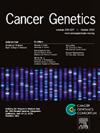56. Variants of established clinical significance: Progress and challenges in the VECS SC-VCEP
IF 1.4
4区 医学
Q4 GENETICS & HEREDITY
引用次数: 0
Abstract
The ClinGen Somatic Clinical Domain Working Group is working to develop and implement standards and guidelines for the curation of clinically significant cancer variants for new and emerging actionable genes. Characterizing variants with established clinical significance, especially predictive biomarkers and genomic variants with FDA-approved companion diagnostics classified under the AMP/ASCO/CAP Tier 1A category is of particular interest. However, interpreting such variants can present challenges due to insufficient detail in both the literature and FDA documentation, inadequate characterization of their function, direct correlation with disease, and associated therapeutic response. To address these challenges, the Variant of Established Clinical Significance (VECS) SC-VCEP was established to curate and maintain a comprehensive database of clinically significant somatic variants.
The VECS SC-VCEP will address a set of 15 genes: BRAF, EGFR, ERBB2, ESR1, EZH2, FGFR3, FLT3, IDH1, IDH2, KIT, KRAS, MET, NRAS, PIK3CA, and RET. Alterations in these genes are known drivers in various types of cancer and consist of SNVs, small indels, and exon loss. The VECS is piloting the ClinGen/VICC/CGC oncogenicity SOP and AMP/ASCO/CAP guidelines, focusing on 17 variants from 9 genes. The set of variants includes both well-studied and poorly characterized variants, variants that confer both resistance and sensitivity to FDA-approved drugs, and includes one representative gene from known pathways.
The VECS will determine the applicability of existing SOP codes and identify instances where additional criteria might be necessary for accurate code assignment. This initiative will ultimately provide publicly-available and high-quality oncogenic and predictive assertions to be utilized by clinicians and researchers.
56.具有确定临床意义的变异:VECS SC-VCEP 的进展与挑战
ClinGen 体细胞临床领域工作组正致力于制定和实施有关标准和指南,以便对具有临床意义的新出现的可操作基因癌症变异进行整理。对已确定具有临床意义的变异,特别是预测性生物标记物和已获得 FDA 批准的辅助诊断(归入 AMP/ASCO/CAP Tier 1A 类别)的基因组变异进行特征描述尤其令人感兴趣。然而,由于文献和 FDA 文件不够详细,对其功能、与疾病的直接相关性和相关治疗反应的描述也不充分,解释这类变异可能会面临挑战。为了应对这些挑战,我们建立了具有确定临床意义的变异(VECS)SC-VCEP,以策划和维护一个具有临床意义的体细胞变异综合数据库:VECS SC-VCEP 将处理一组 15 个基因:BRAF、EGFR、ERBB2、ESR1、EZH2、FGFR3、FLT3、IDH1、IDH2、KIT、KRAS、MET、NRAS、PIK3CA 和 RET。这些基因的改变是各种类型癌症的已知驱动因素,包括 SNV、小嵌合和外显子缺失。VECS 正在试行 ClinGen/VICC/CGC 致癌 SOP 和 AMP/ASCO/CAP 指南,重点关注 9 个基因中的 17 个变异。VECS 将确定现有 SOP 编码的适用性,并找出准确分配编码可能需要额外标准的情况。该计划最终将为临床医生和研究人员提供可公开获取的高质量致癌和预测论断。
本文章由计算机程序翻译,如有差异,请以英文原文为准。
求助全文
约1分钟内获得全文
求助全文
来源期刊

Cancer Genetics
ONCOLOGY-GENETICS & HEREDITY
CiteScore
3.20
自引率
5.30%
发文量
167
审稿时长
27 days
期刊介绍:
The aim of Cancer Genetics is to publish high quality scientific papers on the cellular, genetic and molecular aspects of cancer, including cancer predisposition and clinical diagnostic applications. Specific areas of interest include descriptions of new chromosomal, molecular or epigenetic alterations in benign and malignant diseases; novel laboratory approaches for identification and characterization of chromosomal rearrangements or genomic alterations in cancer cells; correlation of genetic changes with pathology and clinical presentation; and the molecular genetics of cancer predisposition. To reach a basic science and clinical multidisciplinary audience, we welcome original full-length articles, reviews, meeting summaries, brief reports, and letters to the editor.
 求助内容:
求助内容: 应助结果提醒方式:
应助结果提醒方式:


